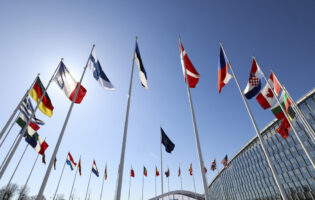Is Far-right Violence a Threat to the West?
Speaker:
Dr. Josefin Graef, DAAD/AGI Research Fellow
Moderator:
Mr. Hans Kundnani, Chatham House
Both Germany and the United States have declared far-right violence the biggest domestic extremist threat to liberal democracy. The Biden administration and the Scholz-led government have also pushed for a public dialogue about the historical and social roots of this violence in their countries amidst a tense political climate. At the same time, however, violent far-right networks are increasingly shifting from a purely nationalist perspective towards the idea of defending the white Christian West against its enemies: (Muslim) immigrants and the domestic elites that conspire with them against their own people. This challenges the transatlantic community to think about the problem of far-right violence in different, more international terms. Is far-right violence a threat to the “West” as a whole, as the Munich Security Conference asserted in 2020? If so, what does this mean for different countries and their particular relationship to the “West” – including Germany and the United States?
This webinar analyses these questions by drawing on the work of Reinhold Niebuhr, the well-known U.S. theologian of German descent. What can Niebuhr’s thinking about power, ethics, and identity, published in a wide range of sermons, articles, and books from the 1920s to the 1960s, teach us about the potential and limits of the world community in confronting far-right violence today?
Dr. Josefin Graef
Dr. Josefin Graef is a narrative scholar focusing on the place of far-right violence and terrorism in the social and political imagination of the European and global “West” since the end of the Second World War. Dr. Graef holds a PhD in Political Science and International Studies from the University of Birmingham. She is a visiting researcher at the Aston Centre for Europe at Aston University in Birmingham and was a Dahrendorf Postdoctoral Fellow at the Hertie School in Berlin from 2018 to 2019. From 2017 to 2023 she co-convened the German Politics Specialist Group of the UK Political Studies Association (PSA).
Event Summary
Decline of “the West”
The Munich Security Conference is the leading forum for debating the most pressing challenges to international security. The 2020 MSC Report gave a grim outlook for the Western liberal order, stating that “the West” was in decline, also speaking of an emerging “Westlessness.” The security report gives two reasons for the Western identity crisis:
- The decline of the West is partly due to external factors like great power competition, especially from China and Russia.
- The contemporary spiritual disunity of the West is due to the rise of an illiberal and nationalist camp within the Western world leading to right-wing extremism as a non-traditional security threat.
Far-right Violence
Proponents of this closed, illiberal interpretation of the West, focusing on being white and Christian, believe that the West today is being threatened by “outsiders” with different religious beliefs or cultural backgrounds. In its most extreme variant, this line of thinking about the West has led white nationalists to attack synagogues and mosques and kill citizens and politicians with different political beliefs. While its adherents are highly heterogeneous, right-wing extremism commonly refers to the act of supporting or committing violence based on the belief in one’s racial, ethnic, or cultural supremacy; fierce nationalism; and/or opposition to government authority. Right-wing extremism represents a security threat in a narrow sense because these ideas inspire violent acts and nourish fears of demographic change. More moderate variations of this stream of thinking are represented in most Western political systems. Even though there has been no upward trend in fatal right-wing extremist attacks in the last ten years, right-wing terrorism is perceived as a major security threat by citizens in Western countries, especially in Germany and the United States.
The Westernization of the far-right threat
We can observe an increasing process of Westernization of far-right extremism. Increasingly, core elements of the Western order are being incorporated into the rhetoric of extremists, mentioning democracy, order, and civil rights on the one hand, and whiteness and Christianity on the other. The correlation between these is presented as causal: Western values and rights are due to Christian faith and whiteness. Far-right extremists mobilize emotions of loss and betrayal, since in the opinion of far-right extremists, Western culture needs to be saved from other cultural influences and opposing political elites who want to destroy Western values. Moreover, this places their civilizational ideas in a larger context and links them to other security threats such as migration, war, and health.
How can Western liberal democracies respond to that false promotion of Western ideas?
Much of the answer to this question can already be found in the 2020 MSC Report. The liberal order described therein as the “good West” must respond in a unified way to the civilizational argument of the extremists. However, it is important to remember that the meaning of “the West” may differ depending from country to country. While in Germany the West has taken on an idealized meaning as a way of overcoming the Nazi past and creating a unifying identity, in the United States, the concept of the West had become less important in public discourse. Even though the war in Ukraine has revived the unifying effect of the West as a concept, the Western mentality is in a fragile state. So how can we still find a common response to the threat of right-wing extremism? We need to take a more critical view of the concept of the West. Being “Western civilized” was a powerful weapon to justify the domination of others outside of Europe. That is why we need a more critical approach to the concept of the West, especially in light of the growing violent far-right.
Reinhold Niebuhr’s Christian Realism
Reinhold Niebuhr’s Christian Realism can help achieve a more critical perspective of “the West.” Reinhold Niebuhr was a towering figure of twentieth-century religious thought and political science, being deeply connected to both the United States and Germany.
His theory contains the following main arguments:
- Humans have the capacity and ethical responsibility to work toward a more just world.
- While our God-given freedoms allow us to do good and transcend ourselves, we often overestimate our capacities and try to take the place of God, which leads to us falling into sin.
- This dialectic of capacities and limits, transcendences and sin drives history and plays out in politics. It is particularly pronounced in international politics, because nations rely on forms of pride to create a sense of community.
When dealing with the far-right, in Niebuhr’s context we need to be humble and self-critical without losing sight of our bigger goal to promote liberal values and fight right-wing extremism. We can see that this kind of self-critical response along Niebuhr’s suggestion is emerging in Western countries. One of many examples of this can be found in a recent speech by President Biden: “We should know about our country. We should know everything: the good, the bad, the truth of who we are as a nation. That’s what great nations do, and we are a great nation.”
Far-right violence increasingly thrives on narratives of Western supremacy that combine virtues such as freedom, democracy, or civil rights and vices such as white Christian supremacy. Responding to these narratives requires a critical approach to Western liberal democracy that accounts for past and present sins of pride like domination, ignorance, and self-righteousness. This is the only way for the Western order to stand united and successful against the security threat of right-wing extremism.
This event is supported by the DAAD with funds from the Federal Foreign Office.






